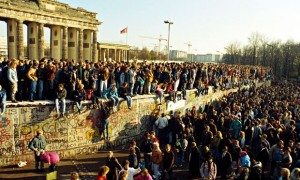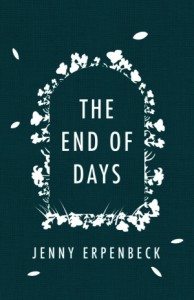 Twenty-five years ago today the Berlin Wall that had divided East and West Berlin since 1961 was opened. This happened precipitously and with extreme euphoria, though the East German government had been preparing to allow its citizens to travel far more freely in response to ongoing massive peaceful demonstrations and in light of the fact that it had become increasingly easy for East Germans to escape to the West via other Eastern Bloc countries (particularly Hungary), and more and more of them were doing so. Politburo member Günter Schabowski, who had been handed a document concerning a new decision to ease travel restrictions for East German citizens on his way to an early-evening press conference about other matters, wound up reading aloud from this paper in response to questions from an Italian journalist, inadvertently announcing the new travel policy, which no one had told him was not to be made public until the official press release came out the following day. The news spread like wildfire over West Berlin radio stations, which many East Berliners listened to, and the American radio station RIAS [Radio in the American Sector] soon reported (erroneously): “The GDR has announced that its borders have now been opened for everyone. The gates in the Wall are standing wide open.” Soon thousands of East Berliners had gathered at all the checkpoints, demanding passage to West Berlin. And while East German authorities had never intended to just open the wall – the new travel policy would still have involved regulation, formal applications, and the possibility of denying requests to travel – the officials in charge realized that they would have to either open the Wall or risk massive bloodshed in confrontations with border guards, and they took the leap and gave orders to open the border. It was a truly incredible moment. I remember finding out about it the next morning while walking down Skinker Blvd. in St. Louis on the way to the Washington University campus and passing a newspaper box; I did a double take when I glimpsed the front page of the New York Times and its headline announcing that the Wall was open, along with a big photograph of people standing on top of the wall in front of the Brandenburg Gate, a surreal image.
Twenty-five years ago today the Berlin Wall that had divided East and West Berlin since 1961 was opened. This happened precipitously and with extreme euphoria, though the East German government had been preparing to allow its citizens to travel far more freely in response to ongoing massive peaceful demonstrations and in light of the fact that it had become increasingly easy for East Germans to escape to the West via other Eastern Bloc countries (particularly Hungary), and more and more of them were doing so. Politburo member Günter Schabowski, who had been handed a document concerning a new decision to ease travel restrictions for East German citizens on his way to an early-evening press conference about other matters, wound up reading aloud from this paper in response to questions from an Italian journalist, inadvertently announcing the new travel policy, which no one had told him was not to be made public until the official press release came out the following day. The news spread like wildfire over West Berlin radio stations, which many East Berliners listened to, and the American radio station RIAS [Radio in the American Sector] soon reported (erroneously): “The GDR has announced that its borders have now been opened for everyone. The gates in the Wall are standing wide open.” Soon thousands of East Berliners had gathered at all the checkpoints, demanding passage to West Berlin. And while East German authorities had never intended to just open the wall – the new travel policy would still have involved regulation, formal applications, and the possibility of denying requests to travel – the officials in charge realized that they would have to either open the Wall or risk massive bloodshed in confrontations with border guards, and they took the leap and gave orders to open the border. It was a truly incredible moment. I remember finding out about it the next morning while walking down Skinker Blvd. in St. Louis on the way to the Washington University campus and passing a newspaper box; I did a double take when I glimpsed the front page of the New York Times and its headline announcing that the Wall was open, along with a big photograph of people standing on top of the wall in front of the Brandenburg Gate, a surreal image.
For East Germans, the fall of the Wall represented an enormous change to life as they knew it. For East Germans my age, it meant in many cases, among other things, learning that the university degrees they had just completed were invalid and that they would have to start over. For East Germans their parents’ age, it meant in many cases immediate unemployment that would sometimes prove permanent. And for all the triumphalism surrounding “unification” or “reunification” (the choice of word was political), many East German voices continued to point out all the things that had been functional and good in East German society: public health and child care, no unemployment, almost no poverty. For many, joining the capitalist West was a mixed bag, though of course the freedom to travel, the (relative) freedom of the press and the end of constant surveillance were warmly received.
 This week with its anniversary also marks the publication (on Nov. 11) of my translation of the novel The End of Days by East German author Jenny Erpenbeck – she was 22 years old when the Wall fell and is highly conscious in her work of having grown up in the East. This novel features characters whose political convictions (they are Communists in Nazi Germany and Austria) prompt them to emigrate to the Soviet Union, though things do not go well for them there, and the novel’s protagonist is happy and relieved to find a home in East Berlin, where her work as a writer can finally serve the cause she believes in. This is the fourth book by Jenny I’ve translated, and I think it’s her best to date. You can hear her speaking about it in English in a brief interview broadcast on NPR’s Weekend Edition today.
This week with its anniversary also marks the publication (on Nov. 11) of my translation of the novel The End of Days by East German author Jenny Erpenbeck – she was 22 years old when the Wall fell and is highly conscious in her work of having grown up in the East. This novel features characters whose political convictions (they are Communists in Nazi Germany and Austria) prompt them to emigrate to the Soviet Union, though things do not go well for them there, and the novel’s protagonist is happy and relieved to find a home in East Berlin, where her work as a writer can finally serve the cause she believes in. This is the fourth book by Jenny I’ve translated, and I think it’s her best to date. You can hear her speaking about it in English in a brief interview broadcast on NPR’s Weekend Edition today.
Earlier this year, Jenny also wrote a long essay about her memories of her childhood in East Berlin (she went to school half a block from the Wall) and how she experienced the events of November 1989. An excerpt from this essay has just been published on the website of The Paris Review.

